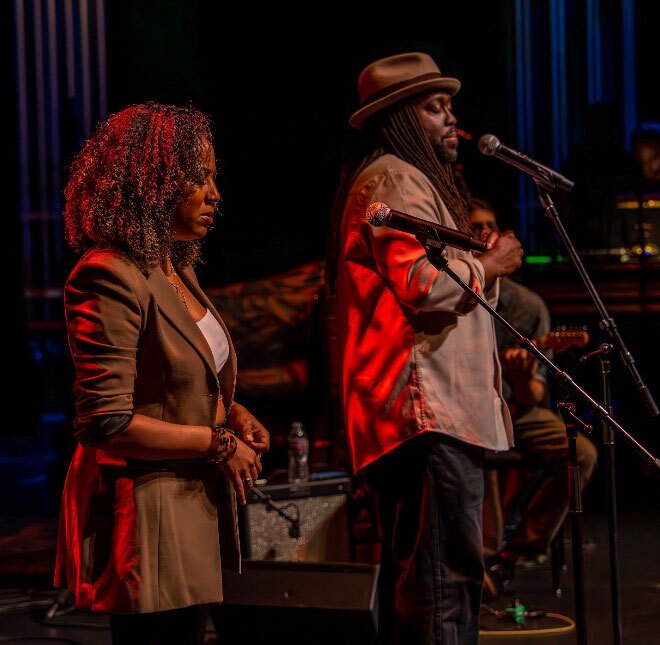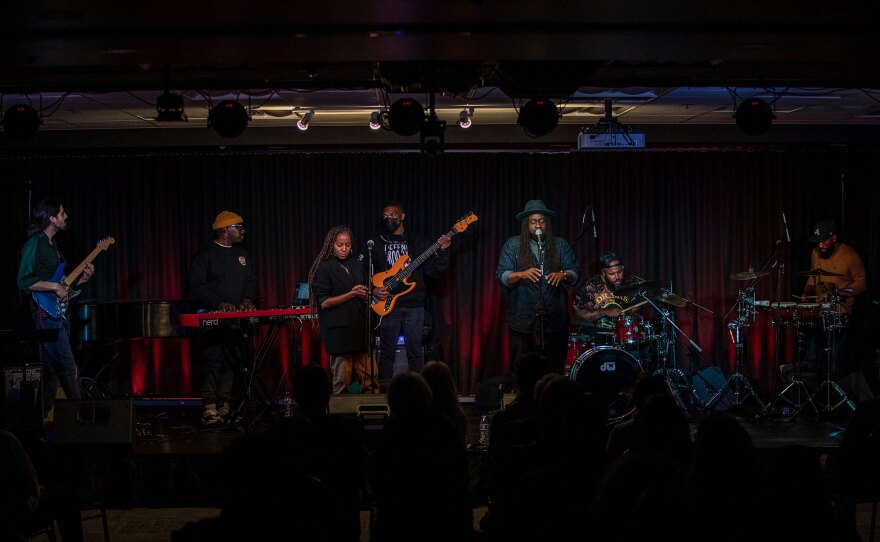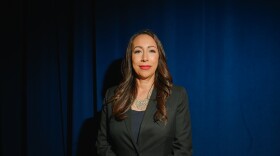The Lyrical Groove is a long-running spoken word and hip-hop group featuring Kendrick Dial and Brisa Lauren, and the winner of multiple San Diego Music Awards for Best Hip-Hop/Soul Album. The group pairs spoken word with live instrumentation as a backdrop, to create a sound that toes the line between poetry and song. It's a captivating sound, and it's intertwined with San Diego's rich spoken word and hip-hop history.
Dial was involved in the influential local spoken word performance series Elevated, which was founded in 2005. He joined KPBS Midday Edition in the studio to discuss his music, the spoken word scene in San Diego — and to perform a few tracks.
The following interview has been lightly edited for length and clarity.
Julia Dixon Evans, KPBS: Kendrick, I want to start with the sound of Lyrical Groove. How would you describe it? And why does the style of music work for the type of art you create?
Kendrick Dial: I like to call it "spoken soul," because there's an element of just, you know, speaking in poetry and even with the name Lyrical Groove, the lyrics are such an important piece of it. But soul is the music, and when you think about soul music and where it comes from, the impact, that's really what we try to encapture. And the fact that we touch on so many different aspects of music — of Black music — in terms of soul and jazz and hip-hop and R&B and gospel. Like if you listen you can hear all those different elements there. So I just like to say spoken soul.

KPBS: I want to zoom out a little bit and talk about spoken word as a genre too. What are some of the hallmarks or the structures of that genre?
Dial: I think that's kind of the nuance and the beauty of it, because it's not that structured in the sense that — you know how free verse — you think about song structure, right, in terms of a verse, the chorus, a bridge and those things, but when it comes to poetry it's a lot more free and you can incorporate different elements, in terms of poetic nuance and literary nuance, in terms of the writing of it. And being able to display the imagery and assonance and onomatopoeia and all these different things… the meter and the lyrical expression of it, but outside of that it's really kind of free. You get a little something of everything.
KPBS: The Lyrical Groove as a project is closely intertwined with the history of Elevated in San Diego, which is this poetry open mic that started almost 20 years ago — right?
Dial: You make it sound so far away. Yeah, that's about right. Yeah.
KPBS: Can you talk about what that series has meant to San Diego's spoken word and hip-hop scene?
Dial: I think it really allowed a space for artists — and I kind of don't want to limit to simply spoken word and hip-hop just because the impact was so much more, because people came there and they found a voice, whether they got up on the mic or didn't, it created a space for community. I have friends who've, you know, used to go to Elevated and then moved to New York, and because they attended Elevated, ran into other people who had come through Elevated and performed and now created new community all the way on the East Coast. I think the dynamic of being able to permeate throughout San Diego — like, we performed at schools, churches, events and whatnot — so it was also this space where people could see how poetry could be used and go further than just on the page. And we could see the connection to activism. We could see the connection to theater and all these other expressions of life. And so it just became so much more, and created a very vast community and connections — and connected to all these other realms of theater and music and everything. So it was just really a great time to be a part of that. And it's interesting because I was exploring doing a documentary about it, and whenever I say 'hey, you know Elevated?' it's just like people's faces light up. The think that we have a call sign in terms of how you feel and it's like [singing] "Elevated!" So it's like, you know, whenever someone goes back there, it's like it goes back to such a rich time in terms of life, expression, culture and connectivity. So yeah, all of that comes up.
KPBS: And how do you see spoken word evolving right now in San Diego?
I know even before Elevated, there was a very rich history of spoken word, from the Taco Shop Poets, Galoka, 504 Gallery — like these places were around and created a space for people to have voice and create communities. So for me, it's just adding to that legacy, that rich legacy of spoken word, and even today with other venues popping up.Kendrick Dial, on the evolution of San Diego's spoken word scene
Dial: It seems to just keep on evolving. I know even before Elevated, there was a very rich history of spoken word, from the Taco Shop Poets, Galoka, 504 Gallery — like these places were around and created a space for people to have voice and create communities. So for me, it's just adding to that legacy, that rich legacy of spoken word, and even today with other venues popping up. There's a number of different — the San Diego Poetry Slam is still going. So that still happens. We still send a slam team out there. Black Xpression happens, Lyrical Exchange was on the scene for a while. And so it's these notable places across San Diego where people get an opportunity to come share their art, create connection and community and it's just continuing to just go throughout San Diego — and beyond because I think one of the beautiful things is being able to see people who used to go to Elevated or our open mics and to see what they become. Our good friend Gill Sotu's writing plays, in terms of Rudy Francisco, he's traveling around the world doing poetry, the poet Vogue, she's out in Vegas. She's — I think she's like the poet laureate? Don't get me wrong. But she represents one of the counties in Nevada… doing stuff out there. Deep is down in Houston doing some great work down there. So it's also being able to see the impact of creating this space, the impact it had on people and then what they've gone on to do.
KPBS: And these are all people who came from the San Diego scene?
Dial: Yeah, or came or just been a part of it for a while and just — you know, it's a small-knit community too. So it's like once you connect, it's like family, so to go and see folks doing these amazing things is pretty dope.
KPBS: I want to have you do a piece, but maybe before we do that, can you talk about — as you are working on a piece, which comes first? Is it the music or is it the poetry?
Dial: So typically, historically I like to say the lyrics kind of come. And it just kind of goes around because I was just so musically inclined. I love music. I always found ways to bring in that nuance, but typically it's the words and then the music. But nowadays, because I've gotten into producing a little bit more, I can tap into creating the music and let the music inspire the words — so I get to go back and forth every now and then, just depending on what's happening or what gets inspired first.
KPBS: And can you do a piece? This is a song that does not have music.
Dial: Yeah. Yeah, I'll do this piece ["Ode to Outkast"] because it's one of my favorite pieces and I actually wrote it in school for an assignment. That's what it ended up. I was taking a Black music class and we had to do a presentation. And so part of my presentation was researching one of my favorite artists. And so this piece came out of that.
KPBS: So good. Thank you. You know, I also want to talk a little bit about your career as a social worker. Can you talk about how the type of work that you do feeds into spoken word storytelling and songwriting — and vice versa?
I think as artists we try to — or we should — as artists we create from our experience and what we do and how we live how we see the world, and I've always been someone that's kind of lived in that social work world, just in terms of like helping people and maybe being a counselor or that friend that people go to just to hear them out.Kendrick Dial, on the intersection of social work and art
Dial: I think as artists we try to — or we should — as artists we create from our experience and what we do and how we live, how we see the world, and I've always been someone that's kind of lived in that social work world, just in terms of like helping people and maybe being a counselor or that friend that people go to just to hear them out. And so just as I've grown in knowledge in that field of work and understanding human behavior and people — all those dynamics of how we show up and just our regular day and lives and relationships is very much a part of me looking at the world and connecting with people.
So the world of social work is just another extension of that, and many of the things in terms of the critique I might provide as an artist looking at the world comes from that lens of how I'm seeing the world and what I've experienced just in my own communities and growing up. So it lays this amazing foundation to have somewhat of a knowledge of these dynamics and how they impact us as well as my own personal experiences. And so when I get to create, the art is really just kind of taking these different perspectives and putting them all together and sometimes making it maybe a little bit more palatable to be able to hear and listen to or maybe just offering a nice backdrop so that these messages can just kind of sing to your soul a little bit more.

KPBS: This Saturday you are performing at UC San Diego's Park & Market Intersections Concert Series with The Lyrical Groove — and the show actually marks your first performance in a while.
Dial: Yes.
KPBS: Has that felt a bit strange, stepping back from the performance grind?
Dial: Yes, and no. I think on one hand, because I've been doing a lot of work on the production side recording and working with a few different people and even composing for film. It's still been a space where I've still been creating and whatnot. And we've been living life. My stage ace, Brisa [Lauren], she had her baby a couple years ago. And so just watching — that's my godson — so, watching him grow up, and he's about 18 months old now so he's walking and talking, getting into so much mischief, and my own daughter, she's about to graduate high school and go to college. So it's all of these major life events that are kind of happening too. So life's still been life-ing! We haven't been on stage per se, but we've still been invested heart and soul creatively, you know, we love going to shows, we love going to support friends that are performing and seeing them — it's actually this new crop of artists that are coming up in the city as well. So we may not have been on the stage ourselves, but we've still been around the art itself. So this has been a good space, and it's also allowed us an opportunity to kind of miss it, and so I know getting back on stage, it'll be fun.
KPBS: Can you do another song for us? And also before you get started maybe tell us a little bit about this track? It's called "DaJoynt," and it's your latest single.
Dial: Yes. So "DaJoynt" actually stands for "the journey notwithstanding." And so it is this homage to the arts, music, poetry. If you break down the lyrics you can see the mention of songs and movements and artists and writers and authors and all these different things that at the time when I wrote it were, you know staples in terms of just me exploring music and reading and all this good stuff. So that's what that is. And I think it's a great way — it's probably gonna end up kicking off the album, because it is so much of an homage to the art that influences me. So this piece is called "DaJoynt."
The Lyrical Groove: Spoken Soul and Songversations
The Lyrical Groove performs at 7 p.m. on Saturday, May 18. UC San Diego Park & Market, 1100 Market St., downtown. $25-$35.







